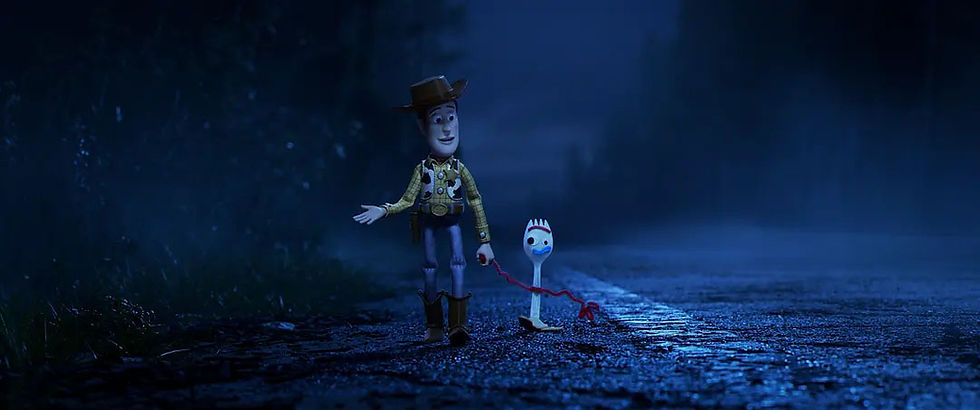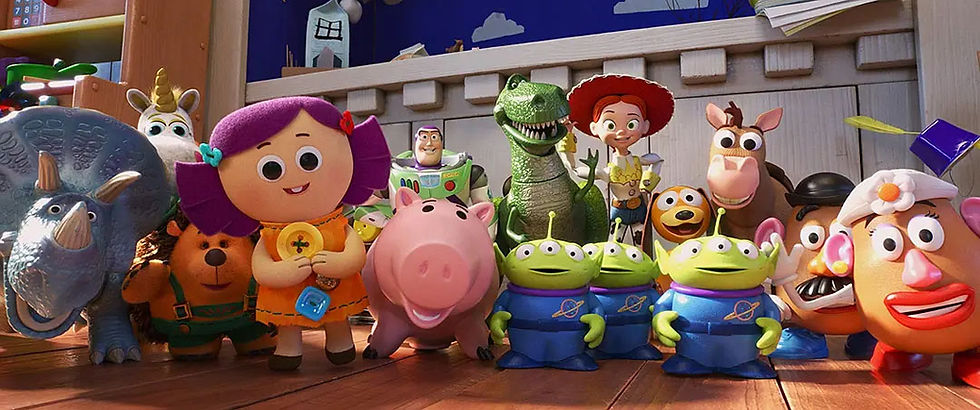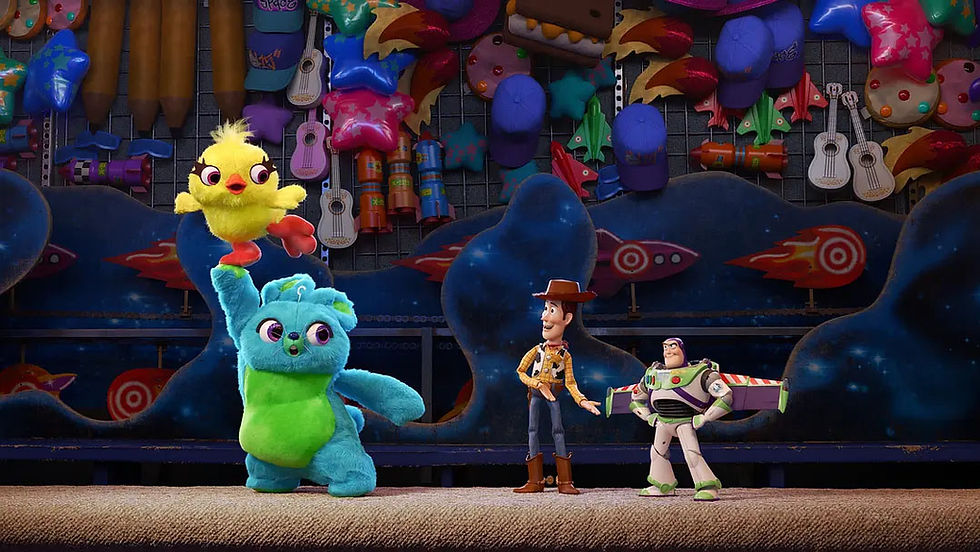Life lessons from 'Toy Story 4'
- lisawilhelmabdzl93
- Oct 6, 2023
- 5 min read
Updated: Nov 2, 2023
The Oscars added the animation category in 2002. Toy Story 1 (1995) and Toy Story 2 (2000) both came out before that, and Toy Story 3 took home the Best Animated Feature award in 2011, and less than a decade later, in 2020, the Oscars gave the same award to Toy Story 4, which was well deserved in the highly competitive animation industry. As a result, the Toy Story series became the only animated film in movie history to win the award again.

YouCine is a streaming platform for movie lovers that eliminates the need to switch between apps.YouCine integrates all of your content into one app, making it easy to find your favorite shows and movies on one platform. Enabling them to explore the world of movies in greater depth, YouCine frequently updates its content library to ensure you always have access to the latest movies, TV shows, and sporting events.
The Universal Value of Toys
Toy Story 4 In the world of toys, if there is a certain kind of toy that has universal value, what would be the meaning and purpose of life? The answer is: to accompany the little master and faithfully bring the child a happy childhood! This is the value of life that Woody, the toy cowboy, firmly believes in, and also the social ethics that Pixar has set for toys, and it is immoral to go against this ethics!
However, the saddest thing about sticking to this "moral" line is that when a toy becomes obsolete and can no longer please its owner, it loses its value, and that's Woody's situation - he has to rediscover the meaning of his existence.

In Toy Story 4, we see Forky, the young master's favorite new love! This is a new toy made by Bonnie at the kindergarten with a discarded fork. The owner attaches a whole new value to this piece of junk, making it a new favorite. However, Forky's self-worth in life is "trash" from the beginning, so he wants to run to the trash can all the time.
Obviously, this is a very serious self-identity disorder, which gives Woody a new mission, to train and protect the new toys, so that they can bring their owners a happy childhood.
Woody realizes that his shelf life is over. Why not focus on training new people when there's no chance of them ever getting back on their feet? Newcomers need guidance from their predecessors to integrate into the toy community, and the traditional ethic of "serving faithfully and giving young owners a happy childhood" must be passed on! Thus, Woody's was given a new lease of life!
Traditional Value Proposition
In Toy Story 4, Woody represents the self-worth of a traditional society: the family, society and moral culture to which I belong determine who I am. People adjust themselves and sacrifice their ego to conform to the expectations of the dominant social culture.
This traditional self-worth orientation, shaped from the outside in, has a very important purpose, which is for the stability and prosperity of the country and society. The noble sense of mission makes personal preferences and interests seem less important.
Remember the movie Titanic? Before the sinking of the ship, the British gentlemen very elegantly yielded the ship to women and children and then went to their deaths with honor. This gentlemanly culture profoundly affects British men: men are expected to conform to this ethical expectation or they will be ostracized, looked down upon, marginalized, and unable to gain a foothold in society.

Men were expected to fit in, to blend in, to give unconditional allegiance to a particular leader. This kind of self-worth orientation, which comes from tradition, inevitably results in a lot of bitterness, injuries and personal tragedies. This is why in our time, the LGBTQ community (meaning sexual minorities) is fiercely rebelling, struggling, and challenging the influences that have been exerted on them by tradition, culture, society, and religion for so long.
The traditional position of self-worth has been beaten into submission, and so the pendulum swings to the other extreme-seeking a position of self-worth from within ourselves.
The Ultimate Value
The Apostle Paul, in his letter to the Corinthian church, presents a whole new vision for the orientation of self-worth - neither from tradition nor from modernity. He says, "I consider it a very small thing that I should be judged by you, or that I should be judged by others; even I myself do not judge myself. Neither can I be justified by it, though I do not consider myself to be in the wrong; but it is the Lord who judges me." 1 Corinthians
This passage is amazing. Paul didn't leave his value proposition up to the community to decide: he didn't care what others thought of him, and if someone tried to judge him with a certain ideology, he simply didn't give a damn. But at the same time, he doesn't feel intelligent enough to judge his own self-worth.
Toy Story 4 Obviously, Paul was confident and often thought his judgment was accurate, but he still knew that only an all-knowing, all-powerful God could give him an ultimate position of value.
Toy Story 4 Another Possibility
In the Christian faith, we know that man's value comes from God, and the Toy Story is neither the Woody nor the Shepherdess route. In the human world, however, we often swing between the Woody and Shepherdess ethical lines.
The Shepherdess does not approve of putting the toys in danger in order to save Forky, and at one point she strongly urges Woody to renounce his foolish loyalty to his master. However, Woody insists that Forky must be saved because "it was the only thing that could justify my existence, otherwise what was left of me?"
Toy Story 4 is a fierce battle between two ethical values!
What's great about Pixar's writers is that they don't make a moral judgment between the two ethical paths of Woody and the shepherdess, which would be preachy, but Toy Story 4 is very subtle and warm. They know that the real ethical situation is extremely complex and cannot be solved by an animation.
Thus, the shepherdess finally fulfills Woody's ethical values through love. But what is most unexpected is the end of the play: Woody, who sticks to the tradition, decides to leave the little master who no longer needs him and goes wandering with the shepherdess.

Woody's change does not mean that he wants to follow the shepherdess's example and "be himself", but that he realizes that "leaving" tradition may not be "losing"; that the old ethical values that he used to believe in may not be firmly established; and that the old ethical values that he used to believe in may not be firmly established. He realizes that "leaving" tradition may not be "losing"; that the old ethical values that he used to believe in may not be unbreakable and absolute truths.
Woody sees another possibility of life in the shepherdess, and the shock of his decision is nuclear! After all, from Toy Story 1 to Toy Story 3, Woody has always been an advocate and defender of traditional ethics. However, Pixar's writers have boldly overturned this value!
I'm sure the story of Toy Story is not over yet, and the adventures of Woody and the Shepherdess are something to look forward to!



Comments